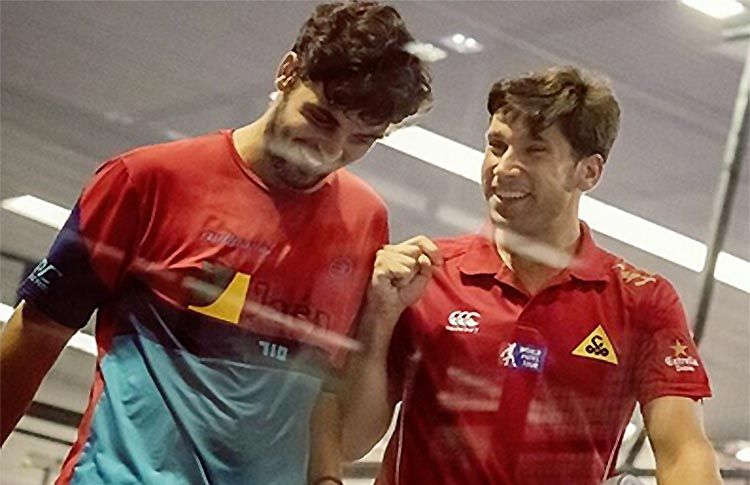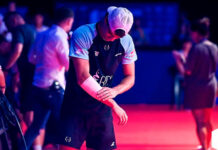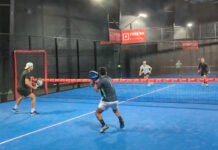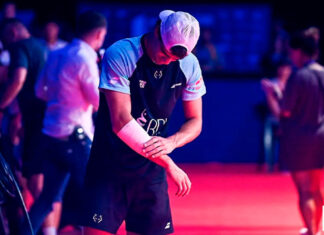On this occasion, we rescued one of the articles that Manu Martín, prestigious coach of Bullpadel, offered to the readers of Padel World Press. In it, the technician gave us a series of tips so that we can get the best possible performance from those days when nothing seems to go well.
Padel World Press .- In this article I would like us to reflect on a situation that all those who play this sport have faced on occasion. No matter how much they train, There are days when everything that can go wrong goes wrong. The ball does not go in, the net seems higher than it is, the opponent's court becomes very small and ours is getting bigger ...
It is at that moment when we look at the shovel, trying to find the reason why we are not able to perform as we would like ... And also in which the great players demonstrate the reason why they are.
The most important thing that I would like readers to know is that most of the times they compete, they will have moments during the game in which the level of play will be below their expectations. That is something natural and it depends on each one to see the glass half empty or half full.
If they analyze the beginnings of a game, they tend to be characterized mostly by short and erratic points, which gradually give way to more elaborate points and greater consistency on the part of all players.
Sometimes, external factors such as wind, temperature, humidity or the type of court favor the game of a specific player and penalize another, which causes one of the four players to reach their expected level of play more quickly while that the 'underprivileged' is uncomfortable and unable to develop their full potential. Other times, it is not necessary to look for the explanation in external factors ... The game developed is simply being bad, well below the usual, and it is this situation that we are interested in working with in this article.
Winning by playing badly or losing trying to play well?
As is evident, it would be perfect to be able to win by playing well but that is not always possible. Therefore, when you are in a match and you are not able to perform as you have been doing in training or previous crashes, think that you are in that commitment to win, not just to land your favorite shot as you have it planned in your head.
Now visualize a game of poker, in which you have to play with some cards that are not the ones you would like to have but are the ones that you have played that day, so you have to try to get the most out of them. It would be great to deal again and wait to have the cards they want but, going back to our paddle tennis court, if they wait for their shots to work with the fluidity they want, by then they will be in the shower remembering how they have started to play well at the end of the last set, just before losing.
I would like to give you some tips so that you can try to get the most 'benefit' to the skills that you face your rival and, with it, be more likely to win the game.
- Trusted areas and error margins
When you notice that you are not playing comfortable and lack precision, choose cross shots. The diagonal trajectory is longer and has greater distance to put the ball into the opponent's field.
If you also choose to volley in the center of the court when you are in the background, it is possible that the rivals make a mistake at some point and can win the net.
When you are in the network, hit away from the walls until you regain confidence. It is preferable that the opponent hits comfortably to have our ball hit the wall.
- Address changes
Check that they obtain greater precision when they maintain the same direction that the ball brings, than when they change the direction of the shot. It is true that it is not very ambitious, but think that the objective of this tactic is not to win the game, but to try not to lose it. As they recover the good feelings they can take risks again.
- Preferred hits
As players, they have their 'special' shots, that shot with which they obtain higher profitability and which fail less frequently. In the matches where they are not playing well, it is time to give prominence to their star shot. Of course, it is not a guarantee of success but from the statistical point of view they will be playing with a greater probability of putting the ball.
- Know the value of each point
Not all points have the same value. For this reason, I suggest you try to be braver at times where you have nothing to lose and conservatives when the point is very valuable. For example:
The opponent is taking out and, therefore, the game should fall on his side. It's an interesting time to try to test more risky punches during the point. The reason is simple: a 30-30 to kick rivals is a very positive one subtracts while the same score, for whom it serves, is a very delicate moment because you have to be very careful with the decisions taken time .
- The interior game
As mentioned in the introduction, the glass can be half empty or half full depending on how the player looks at it. During the worst of the games they have ever been able to play, there will always be moments when they take positive actions such as a good shot, a good volley, a good return or simply forcing a mistake from the opponents at the right time. If you and your partner use these little moments to cheer up and show your opponent a different energy, they can mark a turning point in the match.
Surely they have ever seen an even match but with a couple whose energy seems superior to that of their rivals. They win the serve games with greater solvency, and they show to be more animated. However, the pair that apparently seemed defeated closed the set with a break in an unexpected way and the next set ended in a 6-0 and with the players who until now seemed that they could not find a way to win, crushing some rivals sunk. You and your partner can be the best of yourselves if you have the ability to find opportunities in difficult times.
- The management of rest times
This aspect is very used in the competition. When you notice that your opponent is playing at a high level and you are not comfortable, make maximum use of the rest time between points and between side changes. There are several reasons to extend this waiting time:
- The opponent has more time to think... And also to get impatient. The player who is on the run wants to keep it for longer and, in general, tends to shorten the rest periods so as not to lose concentration.
- Treatments: It is convenient to handle rituals to concentrate on important moments and apply them in moments of rest between points or games. They are a way to maintain the level of play at a stable level during the game.
To finish, and as a summary, when you are in a compromise in which you are not playing at the level you expected to do, do not throw in the towel. Try to implement some of these tips and remember that, to the last point, the game is not finished.
I hope you can help them. Greetings, and see you on the tracks.
Manu Martín
* You can follow all the news of the world of paddle in our profiles of Facebook y Twitter as well as subscribe to our Newsletter .












